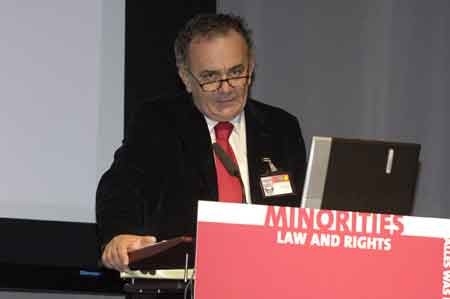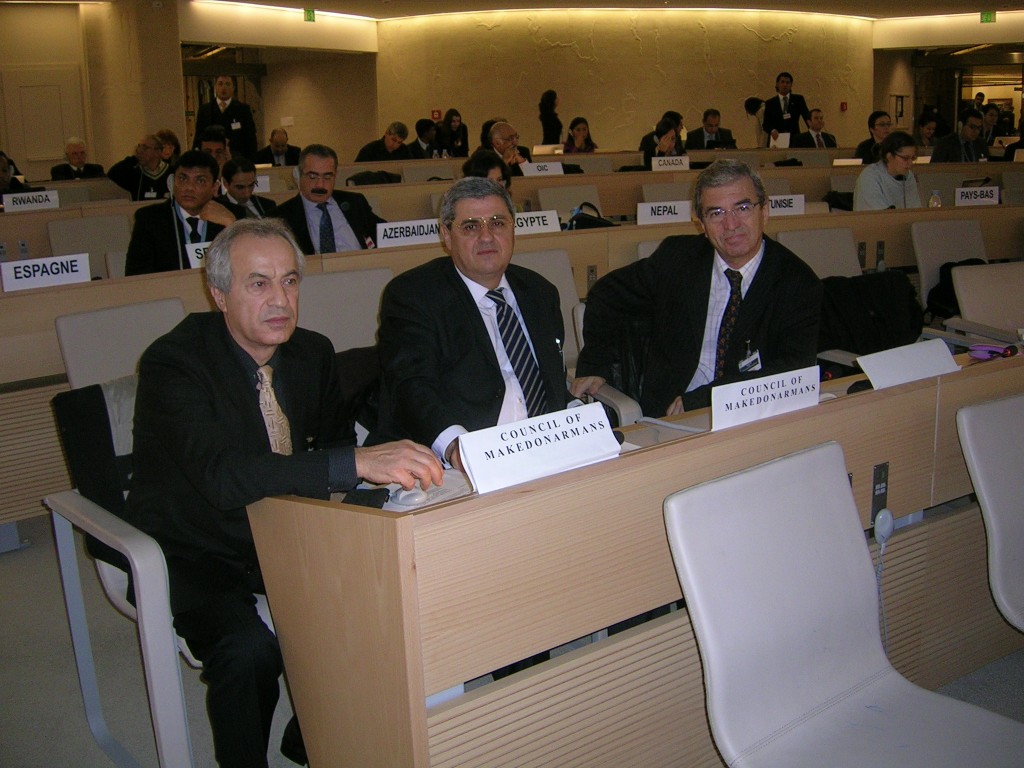Committee on Minorities Rights
Members of the Committee on Minorities Rights
- Hristo Goci(Albania)
- Toma Chiurkci(Bulgaria)
- Steryiu Samara(Romania)
- Nako Nikolovski(R. of Macedonia)
- Sutiri Bletsa(Greece)
- Rapo Kapurani(Albania)
- Custica Canacheu(Romania)
Two legal instruments for protection of minorities
Concerning the protection of the national minorities, the Council of Europe adopted two major legal instruments — The Framework Convention for the Protection of National Minorities (FCNM) and the European Charter for Regional or Minority Languages (ECRML). These two instruments highlight the importance of the preservation and protection of minority languages and of the relationship between minority and state languages. The last year(2008) was celebrated the 10-th anniversary of the ECRML, a unique legal instrument which has no parallel elsewhere in the world.
The Right to be recognised as Minority
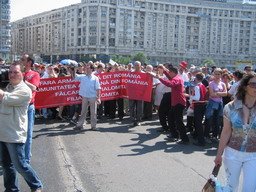 The existence of an ethnic, religious or linguistic minority does not depend on a decision by that State. The existence of a minority must be established by objective criteria. The most obiective criteria is the right of minority to self-identification. A minority is a minority when this could be seen. The existence of a minority is “a matter of fact, not a matter of law” said the International Court of Justice in the interwar period.
The existence of an ethnic, religious or linguistic minority does not depend on a decision by that State. The existence of a minority must be established by objective criteria. The most obiective criteria is the right of minority to self-identification. A minority is a minority when this could be seen. The existence of a minority is “a matter of fact, not a matter of law” said the International Court of Justice in the interwar period.
The most important thing that a minority claims is the right to its existence. Many minority groups are at risk of genocide or „ethnic cleansing“ because of religious, linguistic or ethnic association or affiliation, that is a historical contemporary evidence.
The major lacuna in the international law that could be identified is that, there is no international mechanism that can reverse a state´s refusal to recognise the existence of a minority group.
The European Academy of Bolzano/Bozen (EURAC) invited persons belonging to national minorities, non-governmental organisations and experts working in the field of minority protection to provide their input into a study on indicators for assessing the impact of the Framework Convention for the Protection of National Minorities (FCNM).
This consultation will feed into an evaluation process of the Framework Convention’s impact in its State Parties.
The consultation process was launched in Strasbourg during the conference to mark the 10th anniversary of the FCNM’s entry into force held on 9-10 October 2008. The aim of the study is to identify indicators that would help to review the impact of the FCNM in the legislative and political environment as well as in the field of the judiciary.
The protection of national minorities is essential to stability, democratic security and peace in Europe. A pluralist democratic society should respect the ethnic, cultural, linguistic and religious identity of each person belonging to a national minority, should also create appropriate conditions enabling them to express, preserve and develop this identity.
The creation of a climate of tolerance and dialogue is necessary to enable cultural diversity to be a source and a factor, not of division, but of enrichment for each society.
„Any attempt to impose an identity on a person, or on a group of persons, is inadmissible“ – the principle set out in Article 3 of the Framework Convention for the Protection of National Minorities.
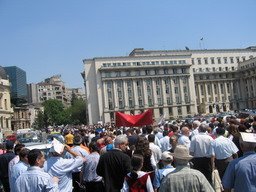 On the occasion of the Anniversary of their National Day, on 23-rd of May, thousands of Armans(Macedonarmans) demonstrate in Bucharest, since 2006 almost each year, taking their protest to the streets of Bucharest.
On the occasion of the Anniversary of their National Day, on 23-rd of May, thousands of Armans(Macedonarmans) demonstrate in Bucharest, since 2006 almost each year, taking their protest to the streets of Bucharest.
They protest the fact that since the 1905 recognition as a distinct people in Balkan, by the Otoman Empire, is totally ignored by the Romanian Government that does not really recognize this people as a minority in Romania.
Many written protests made by the leaders of The Arman Community of Romania, community which counts more than ten thousand members, have always been ignored by the Government and remain, for more than three years, without results.
Based on the Romanian Laws, only groups with a recognized minority status are allowed to have schools teaching in their mother tongue, with mother tongue books and curriculum. They need this because the only place to practice the Arman language is at home since they do not have an officially recognized public forum to exercise their freedoms.
The main aim of the Arman Community is to preserve and develop the Arman language,traditions and the entire spiritual and cultural armân specific. 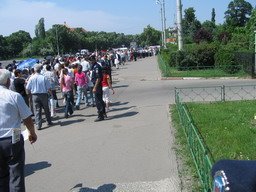
Even demarches concerning the application of the Recommendation 1333/1997 have unfortunately failed because in acordance with national legislation the Armâns can not enjoy the specific rigths of the persons belonging to ethnic groups as they are not de jure recognised as a national minority.
Minderheiten, „Alles was Recht ist…!!!“
Bolzano, 25-27 Okt. 2006
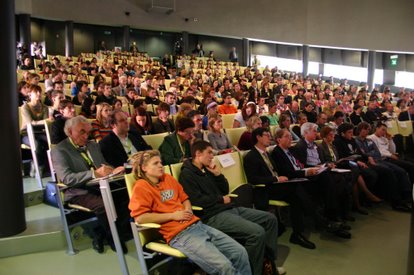 Zusammenarbeit ist die notwendige Voraussetzung für Minderheiten, nur Gemeinsam kann man etwas bewegen um viel erreichen zu können. Europapolitik, spielt im diesen Sinne eine entscheidende Rolle.
Zusammenarbeit ist die notwendige Voraussetzung für Minderheiten, nur Gemeinsam kann man etwas bewegen um viel erreichen zu können. Europapolitik, spielt im diesen Sinne eine entscheidende Rolle.
Die Minderheitentagung „Minderheiten „Alles was Recht ist…!!!“ hatte am Mittwoch den 25 Oktober 2006 begonnen und andauerte bis Freitag Abend den 27 Oktober. Bereits am Mittwoch Abend hatte im Rahmen der Minderheitentagung die Erstaufführung des Films „“The Wind That Shakes the Barley“ von Ken Loach stattgefunden.
Bei der Tagung ging es es vor allem um die rechtliche Situation der verschiedenen Minderheiten in Europa und um den Vergleich der Lebenssituationen und die Vernetzung untereinander.
Der Europaparlamentarier, Michl Ebner, skizzirte in seiner Rede, den Werdegang des europäischen Minderheitenschutzes, vom Anfang(80er Jahre) bis zur Europäischen Verfassung in unseren Tagen.
Es wurde nachmals auf die Wichtigkeit der Europäischen Institutionen für den Minderheitenschutz sowie auf die Probleme des Minderheitenschutzes auf europäischer Ebene hingewiesen.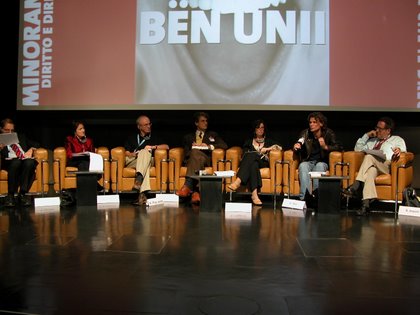
In den Europäischen Verträgen ist der Minderheitenschutz leider nicht festgeschrieben, zu nutzen sei aber die Erfolge für den Minderheitenschutz im Grundrechte- und im Verfassungskonvent.
Wenn man etwas erreichen will, eine Vernetzung der Sprachminderheit in Europa gilt als unerlässlich.
Die derzeitige Zusammenarbeit unter den verschiedenen Minderheitenorganisationen funktioniert nicht so wie sie sollte.
Das Einrichten einer gemeinsamen ständigen Arbeitsgruppe die an der Eurac(Europäische Akademie) in Bozen angesiedelt sein sollte, soll auch für eine strattegische Zussamenarbeit für die nächsten Jahre bis zu einer gemeinsamen Struktur in Brüssel sorgen.
The Council of Macedonarmans wurde bei dieser Minderheitentagung von einer Delegation von 4 Personen representiert.
UNO Forum on Minority Issues
The inaugural session of the Forum on Minorities Issues : „Minorities and the Right to Education“
15-16 Dec.2008, Palais des Nations, Geneva, Switzerland
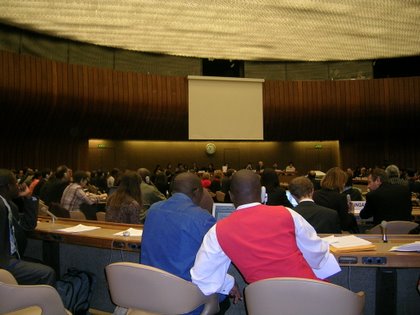 Taking into consideration the article 27 of the International Covenant on Civil and Political Rights as well as other relevant existing international standards and national legislations, taking note of several reports of the Working Group on Minorities which emphasizes the need for a mechanism to serve as forum for dialogue and mutual understanding on minority rights issues, and also taking note of the report of the Secretary-General on the rights of persons belonging to national or ethnic, religious and linguistic minorities, The Human Rights Council decides to establish a forum on minority issues to provide a platform for promoting dialogue and cooperation on issues pertaining to persons belonging to national or ethnic, religious and linguistic minorities, which shall provide thematic contributions and expertise to the work of the independent expert on minority issues.
Taking into consideration the article 27 of the International Covenant on Civil and Political Rights as well as other relevant existing international standards and national legislations, taking note of several reports of the Working Group on Minorities which emphasizes the need for a mechanism to serve as forum for dialogue and mutual understanding on minority rights issues, and also taking note of the report of the Secretary-General on the rights of persons belonging to national or ethnic, religious and linguistic minorities, The Human Rights Council decides to establish a forum on minority issues to provide a platform for promoting dialogue and cooperation on issues pertaining to persons belonging to national or ethnic, religious and linguistic minorities, which shall provide thematic contributions and expertise to the work of the independent expert on minority issues.
The inaugural session of the Forum took place on 15 and 16 December 2008 at the Palais des Nations in Geneva. The thematic focus of this first session of the Forum was „Minorities and the Right to Education“.
The Forum was opened by the President of the Human Rights Council, Ambassador Martin Ihoeghian Uhomoibhi, and opening remarks were made by the High Commissioner for Human Rights, the Independent Expert on Minority Issues , and the Chairperson of the Forum.
The Forum analysed the best practices, challenges, opportunities and initiatives for the further implementation of the Declaration on the Rights of Persons Belonging to National or Ethnic, Religious and Linguistic Minorities.
The Forum was open to the participation of States, United Nations mechanisms, bodies and specialized agencies, funds and programmes, intergovernmental organizations, regional organizations and mechanisms in the field of human rights, national human rights institutions and other relevant national bodies, academics and experts on minority issues and non-governmental organizations in consultative status with the Economic and Social Council.
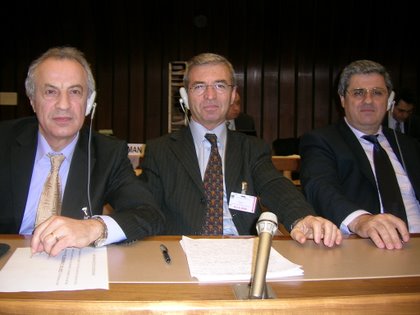 The Forum was also open to other non-governmental organizations whose aims and purposes are in conformity with the spirit, purposes and principles of the Charter of the United Nations.
The Forum was also open to other non-governmental organizations whose aims and purposes are in conformity with the spirit, purposes and principles of the Charter of the United Nations.
Over 370 individuals were accredited from all categories to participate in the Forum, including delegates from over 40 States and representatives of some 90 NGOs.
The Macedonarman Council accredited a delegation of three persons to attend this inaugural session of the Forum.
The views of experts and participants from minority communities were given a particularly high priority within the proceedings of the Forum. Several experts from each region were identified on the basis of criteria including their belonging to a minority group and their professional expertise in the field of education, particularly as it interfaces with the rights and experiences of minorities.
On the basis of the provisions of resolution 6/15 and in the wider context of promoting implementation of the Declaration in all regions, the focus of discussions was broadly based around three core elements: identification of challenges and problems facing minorities and States; identification of good practices in relation to minorities and education; and consideration of opportunities, initiatives and solutions.
The participants were invited to target their contributions towards developing, improving and refining the draft recommendations, which was prepared and circulated prior to the Forum, as the subsequent outcome recommendations document.
Pursuant to resolution 6/15, a summary of the discussions at the Forum was prepared by the Chairperson, and thematic recommendations by the Forum were reported to the Human Rights Council and included in the Independent Expert’s annual report to the Human Rights Council’s 10th session in March 2009.
The second session of the Forum on Minority Issues : „Minorities and Effective Political Participation“.
12-13 Nov. 2009, Palais des Nations, Geneva, Switzerland
The second session of the Forum on Minority Issues took place on 12 and 13 November 2009, at the Palais des Nations in Geneva, Switzerland. The thematic focus of the 2nd session of the Forum was: „Minorities and Effective Political Participation“.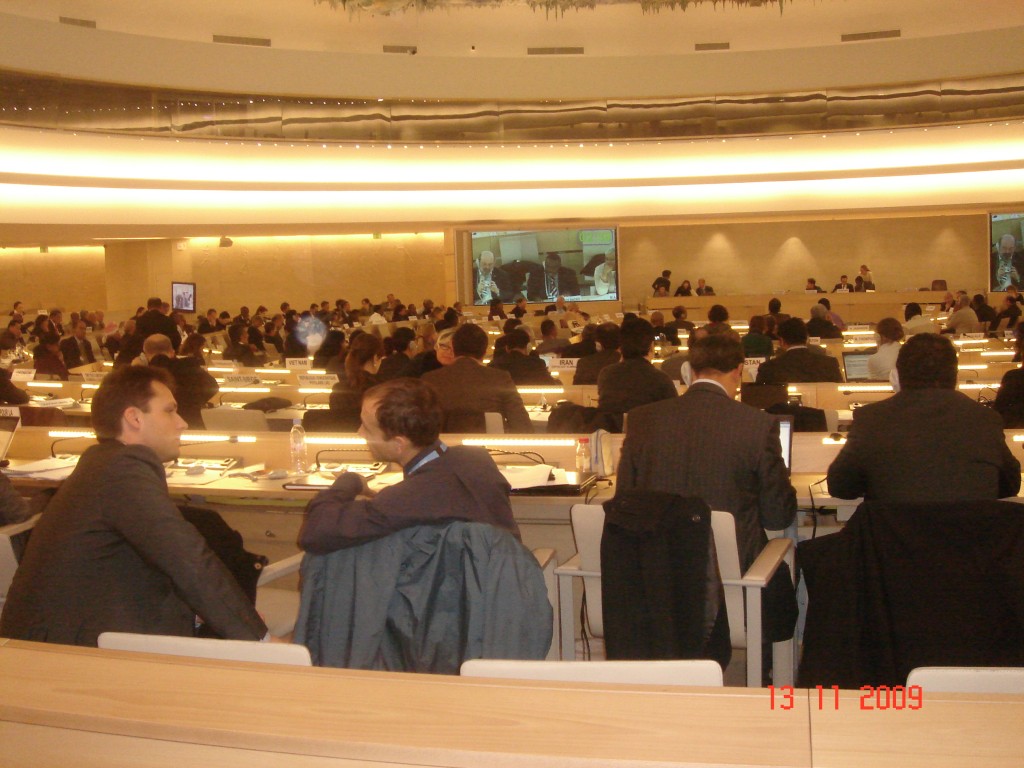
About 500 delegates worldwide, decried the exclusion of ethnic, religious and linguistic minorities from policy and decision making processes at all levels of governance.
The President of the world body’s Human Rights Council, Ambassador Alex Van Meeuwen, Chairperson of the Forum, United States (U.S.) Congresswoman Barbara Lee and the UN’s independent expert on Minority Issues, Miss Gay MacDougall, among others identified the exclusion of ethnic, religious and linguistic minorities from policy and decision making process as one key reason for conflicts within global societies.Meeuwen said global peace would remain elusive as long as these minorities continue to suffer discrimination in policy and decision making processes within societies that they dwell. He observed that voices of minorities were yet to get the needed attention from society, which they deserved and said such situation ought to change. He said minority groups remained an integral part of the global societies, adding that societies can only thrive in an atmosphere of peace when they (minorities) are included in policy and decision-making and also allowed the conducive environment to participate politically.
Many of the participants and experts presentations to the forum were emphasizing the importance of the preconditions needed to the effective political participation of minorities, these includes foremost the importance of social, economic and cultural rights.
The Council of Macedonarmâns attended this second session of UN Forom on Minorities Issues with a delegation of four persons and submitted to the Secretariat of the Forum on Minority Issuesa a statement concerning The Minorities and Effective Political Participation in the Balcan states, focused on Macedonarmâns and had also the following oral presentation :
“Concerning the Political Participation of Minorities in the Balkan States, focused on Macedonarmâns, known also as Macedo-Vlachs, Vlachs, one of the oldest European peoples, living in their historical motherland, the ancient Macedonia, nowadays – Greece, Albania, Former Yugoslav Republic of Macedonia, Bulgaria and also in Romania(in diaspora) – after Macedonia was devided (1913, after the Balkan War), I prepared a powerpoint presentation which has been sent to the Secretariat of the forum.
I just want to point out some concluding remarks regarding unrecognized minorities, who are excluded from political processes. These minorities are prevented to exercise their rights, to have access to all form of political decision-making, at all exesting levels, rights which are focused in all International Standards and European Union Standards on minority issues.
The non-recognition of “de facto” existent minorities, an obstacle to the effective political participation, leads to the marginalization of these minorities and ultimately to the exclusion from the political life. This point of view is also mentioned in the background document on Minorities and Effective Political Participation by the independent expert on minority issues, Mrs. Gay McDougall.
In this sense, a negative example is Romania. The Romanian government, based on its Government Decision H.R. 589 / 2001, in fact a vicious circle, refuses any dialogue on this issue with the Macedonarmân Community of Romania. Although, conform to the Romanian Constitution, Art. 6 ( the right to identity ), the Macedonarmân minority exists “de facto”, but it is “de jure” not recognized. Furthermore, that means a violation of all International and European treaties with regard to minority issues, treaties that they have already signed and ratified.
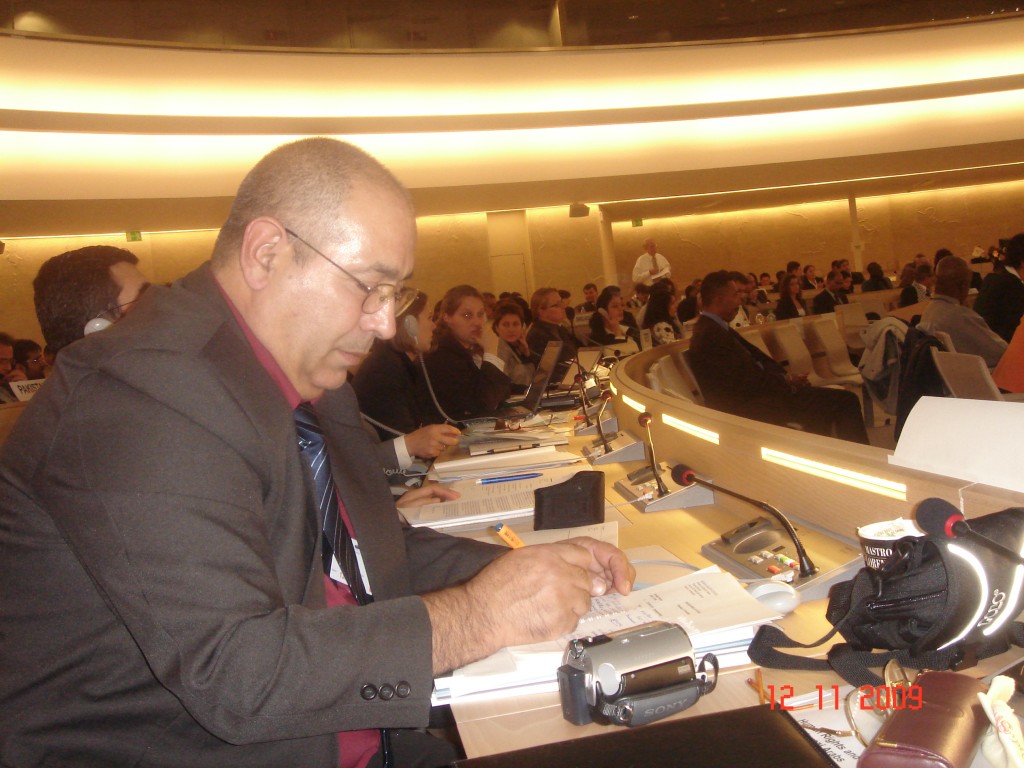 The second issue I would like to point out, regards to the definition of “national minority” made by Albanian government, considering national minority only that minority who has a “kin state”, this fact leads to discrimination and prevents a “non-kin state” minority to enjoy all internationally established rights.
The second issue I would like to point out, regards to the definition of “national minority” made by Albanian government, considering national minority only that minority who has a “kin state”, this fact leads to discrimination and prevents a “non-kin state” minority to enjoy all internationally established rights.
Concerning the EU Standards, it is indeed to appreciate the first legally binding reference on minority rights in the history of the European Union, the text of the Constitutional Treaty, that includes „the rights of persons belonging to minority groups“, although insufficient for a clear and real protection of minorities.
Even, each of the both legally Council of Europe documents, the Framework Convention for the Protection of National Minorities (FCNM) and the European Charter for Regional or Minority Languages(ECRML), constitues only a passiv minority protection, insufficient for the real protection of minorities; an active approach, that is what minorities have been waiting for.”
“ Tinjisitâ Prezidentâ,
Haristo câ-nj si deadi furnjia sâ spunu-ndauâ zboarâ, ligati di tema alushtui forumu.
Tu tsi mutreashti partitsiparea politicâ a minoritătsloru tu craturli ditu Balcanu, va s-angrecu ma multu pi Makedonarmânji, cânâscuts ca Macedo-Vlahi, Vlahi – unu di nai ma vecljili populi evropeani cari bâneadzâ tu patrida a loru istoricâ, veacljea / antica Makidunie – adzâ asprândits tu Gârtsie, Arbinishie, Ripublica Tricuta Iugoslavâ Makidunia (FYROM), Vâryaria, shi România (tu diaspora), cându Makidunia fu ampârtsâtâ la 1913, dupu polimlu balcanicu.
Andrepshu unâ prizintari powerpoint cari fu pitricutâ la sicritariatlu aluishtui forumu.
Voiu sâ scotu tu migdani ndauâ lucri ligati di minoritătsli nipricânâscuti, cari suntu scoasi, dati nanaparti di la protseslu politicu. Aesti minorităts suntu anchidicati sâ-shi bagâ tu practichii-ndrepturli, s-aibâ actsesu la loarea di detsizii politicâ, ndrepturi cari suntu tricuti ca nomuri di simasii tu tuti standardili internatsionali shi la Uniunea Evropeanâ, tu tsi mutreashti problemlu a minoritătsloru.
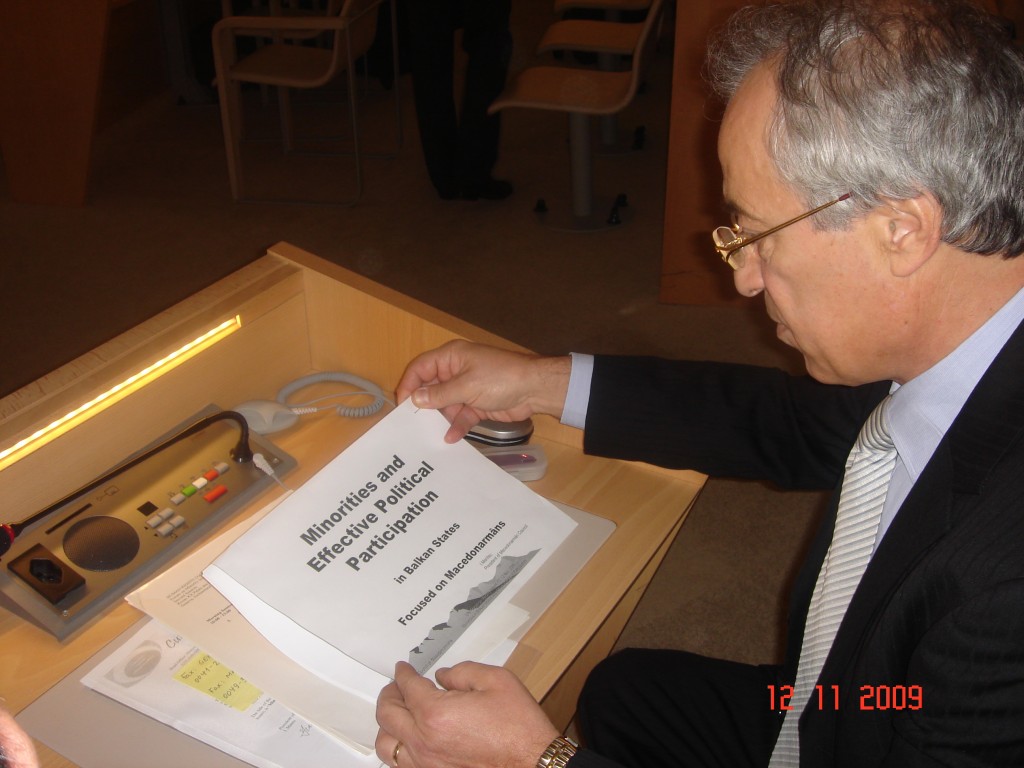 Nipricânushtearea a minoritătsloru cari “de facto” existeadzâ, unu cheadicu trâ partitsiparea efectivâ la politicâ, dutsi la tsânearea tu mardzinâ a alâshtoru minorităts shi, pânâ tu soni, la scutearea loru ditu bana politicâ. Aestu lucru easti spusu shi tu documentulu di fondu / bazâ tu tsi mutreashti Minoritătsli shi Partitsiparea politicâ efectivâ, andreptu di expertulu indipindentu trâ problemlu a minoritătsloru, Doamna Gay McDougall.
Nipricânushtearea a minoritătsloru cari “de facto” existeadzâ, unu cheadicu trâ partitsiparea efectivâ la politicâ, dutsi la tsânearea tu mardzinâ a alâshtoru minorităts shi, pânâ tu soni, la scutearea loru ditu bana politicâ. Aestu lucru easti spusu shi tu documentulu di fondu / bazâ tu tsi mutreashti Minoritătsli shi Partitsiparea politicâ efectivâ, andreptu di expertulu indipindentu trâ problemlu a minoritătsloru, Doamna Gay McDougall.
Tu aestâ dumeni, unâ paradiymâ negativâ easti România. Guvernul ali Românie, s-andrupashti pi Detsizia di Guvernu H:R:589/2001 shi nu aproachi canu dialogu cu Comunitatea Armânjiloru ditu România, cari caftâ pricânushtearea Armâjiloru ca minoritati.
Ma s-lomu Constitutsiunea ali Românie, dupu Nomlu / Art.6 (ndreptulu la identitati), minoritatea Armânâ / Makedonarmânâ existeazâ “de facto”, ama “de jure” (di-ndreptu) nu easti pricânâscutâ. Sh-ma multu, aestâ easti unâ violari / nitinjiseari a tratatiloru internatsionali shi evropeani cari mutrescu problemlu a minoritătsloru sh-cari furâ simnati shi ratificati sh-di guvernulu ali Românie.
Defturlu problemu pi cari voiu s-angrecu easti ligatu di cumu easti luyursitâ definitsiunea “minoritati natsionalâ” tu Arbinishie. Guvernulu arbinishescu luyurseashti “minoritati natsionalâ” mashi atsea minoritati cari ari unu “kin state” (cratu a ljei.) – lucru cari dutsi la discriminari shi-ncheadicâ minoritătsli fârâ “kin state” (cumu suntu Makedonarmânjlji) sâ s-hârseascâ di tuti-ndrepturli cari suntu tricuti tu documentili internatsionali.
Tu tsi mutreashti standardili EU, nâ hârsimu câ ti prota oarâ tu isturia ali Evropi Uniti, tu “Constutional Treaty”, sâ zburashti trâ “ndrepturli a persoaniloru cari facu parti ditu unu grupu minoritaru”, ama aestâ nu easti duri trâ unâ dealihea, realâ, apârari a minoritătsloru.
Luyursimu câ dauli documenti di simasii di la Cunsillu ali Evropi – “Framework Convention for the Protection of National Minorities” (FCNM – Conventsiunea / Acâchisearea Cadru trâ Apârarea a Minoritătsloru Natsiunali) shi “European Charter for Regional or Minority Languages” (ECRML – Carta Evropeanâ trâ Limbili Rigiunali shi minoritari), suntu mashi unâ pasivâ apârari a minoritătsloru, cari nu au duri puteari trâ unâ apârari dealihea / realâ.
Tr-atsea minoritătsli ashteaptâ nomuri ma sânâtoasi, cari s-lâ siyurispseascâ unu actsesu activu la bana politicâ.
Haristo ti-ascultari!
Yiani Mantsu , Prezidentu a Consillui Makedonarmânjiloru “
Documents
Macedonarman-Council-ppt-Presentation-UN-Forum-on-Minority-Issues-2-nd-Session-12-13-Nov.2009
Macedonarman-Council-Oral-Intervention-UN-Forum-on-Minority-Issues-2-nd-Session-12-13-Nov.2009
Framework Convention for the Protection of National Minorities(FCNM)
European Charter for Regional or Minority Languages
Taditional minorities in Europe by MEP Csaba Tabajdi
Recommendations on National Minorities in Inter-State Relations
United Nation Forum on Minority Issues
Institut for Minority Rights (EURAC-European Academy Bozen)
New challenges for the traditional minorities in Europe, by Csaba Tabajdi
Comments of Albanian government on implementation of FCNM(Part-1)
Comments of Albanian government on implementation of FCNM(Part-2)
Comments of Albanian government on implementation of FCNM(Part-3)
Comments of Bulgarian government on implementation of FCNM(Part-1)
Comments of Bulgarian government on implementation of FCNM(Part-2)
Comments of R. of Macedonia government on implementation of FCNM(Part-1)
Comments of R. of Macedonia government on implementation of FCNM(Part-2)
Comments of Romania government on implementation of FCNM(Part-1)
Comments of Romania government on implementation of FCNM(Part-2)
